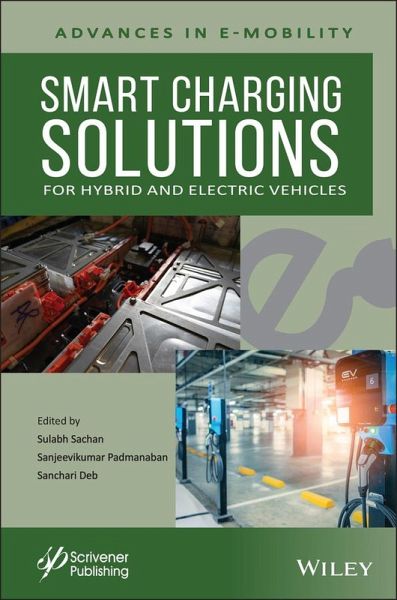
Smart Charging Solutions for Hybrid and Electric Vehicles
Versandkostenfrei!
Versandfertig in über 4 Wochen
216,99 €
inkl. MwSt.
Weitere Ausgaben:

PAYBACK Punkte
108 °P sammeln!
SMART CHARGING SOLUTIONSThe most comprehensive and up-to-date study of smart charging solutions for hybrid and electric vehicles for engineers, scientists, students, and other professionals.As our dependence on fossil fuels continues to wane all over the world, demand for dependable and economically feasible energy sources continues to grow. As environmental regulations become more stringent, energy production is relying more and more heavily on locally available renewable resources. Furthermore, fuel consumption and emissions are facilitating the transition to sustainable transportation. The ...
SMART CHARGING SOLUTIONS
The most comprehensive and up-to-date study of smart charging solutions for hybrid and electric vehicles for engineers, scientists, students, and other professionals.
As our dependence on fossil fuels continues to wane all over the world, demand for dependable and economically feasible energy sources continues to grow. As environmental regulations become more stringent, energy production is relying more and more heavily on locally available renewable resources. Furthermore, fuel consumption and emissions are facilitating the transition to sustainable transportation. The market for electric vehicles (EVs) has been increasing steadily over the past few years throughout the world.
With the increasing popularity of EVs, a competitive market between charging stations (CSS) to attract more EVs is expected. This outstanding new volume is a resource for engineers, researchers, and practitioners interested in getting acquainted with smart charging for electric vehicles technologies. It includes many chapters dealing with the state-of-the-art studies on EV smart charging along with charging infrastructure. Whether for the veteran engineer or student, this is a must-have volume for any library.
Smart Charging Solutions for Hybrid and Electric Vehicles:
_ Presents the state of the art of smart charging for hybrid and electric vehicles, from a technological point of view
_ Focuses on optimization and prospective solutions for practical problems
_ Covers the most important recent developmental technologies related to renewable energy, to keep the engineer up to date and well informed
_ Includes economic considerations, such as business models and price structures
_ Covers standards and regulatory frameworks for smart charging solutions
The most comprehensive and up-to-date study of smart charging solutions for hybrid and electric vehicles for engineers, scientists, students, and other professionals.
As our dependence on fossil fuels continues to wane all over the world, demand for dependable and economically feasible energy sources continues to grow. As environmental regulations become more stringent, energy production is relying more and more heavily on locally available renewable resources. Furthermore, fuel consumption and emissions are facilitating the transition to sustainable transportation. The market for electric vehicles (EVs) has been increasing steadily over the past few years throughout the world.
With the increasing popularity of EVs, a competitive market between charging stations (CSS) to attract more EVs is expected. This outstanding new volume is a resource for engineers, researchers, and practitioners interested in getting acquainted with smart charging for electric vehicles technologies. It includes many chapters dealing with the state-of-the-art studies on EV smart charging along with charging infrastructure. Whether for the veteran engineer or student, this is a must-have volume for any library.
Smart Charging Solutions for Hybrid and Electric Vehicles:
_ Presents the state of the art of smart charging for hybrid and electric vehicles, from a technological point of view
_ Focuses on optimization and prospective solutions for practical problems
_ Covers the most important recent developmental technologies related to renewable energy, to keep the engineer up to date and well informed
_ Includes economic considerations, such as business models and price structures
_ Covers standards and regulatory frameworks for smart charging solutions













